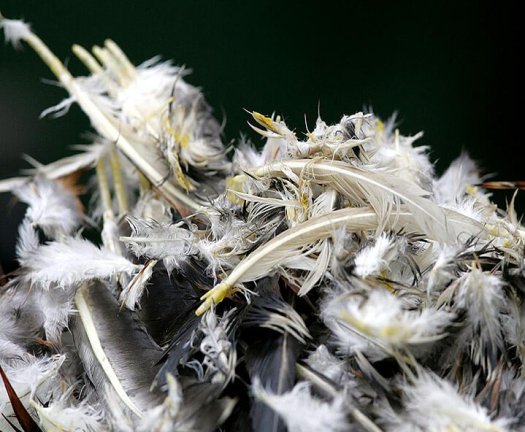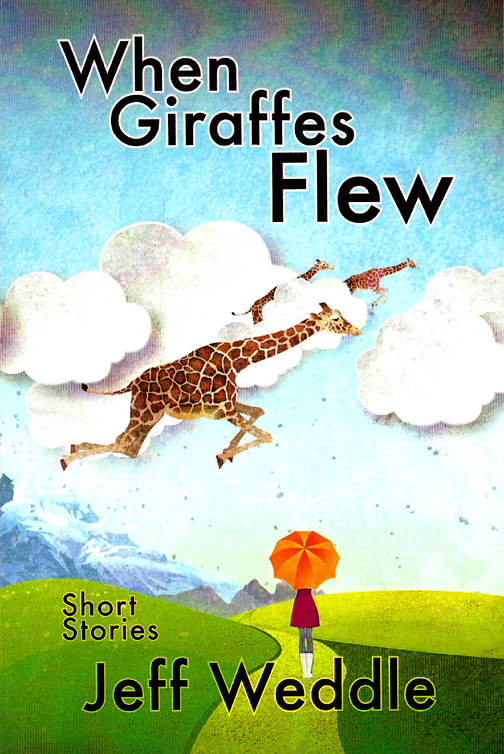This absolute gem of a story by Jeff Weddle, a man of many parts, but a poet at heart, was inspired by true events. It’s the lead item in his brilliant collection, When Giraffes Flew (SYP; Tallahassee, 2015).
You’re ten years old the day the chickens explode. What could possibly prepare you for this? You’re in the living room watching TV, and you hear the bang out in the yard, and you run to the door. A pickup truck is turned over beside a broken elm tree, and there are chicken crates everywhere and chickens all over the yard. Some of the chickens look dead already, but others are screaming and running around flapping their wings. Poochie and Smoke appear from somewhere out back and lay in on the chickens. They bite the heads and sling the bodies, both just the same, as if they had been taught to do this. They kill the birds and eat their fill, then kill more and leave them lying dead on the lawn.
“Mama,” you scream, but she’s not there. She’s visiting her sister in town, and you’re in the house alone-just you and the wrecked truck in the yard and all those chickens. Dead chickens, dying chickens, chickens being murdered by the dogs. The scene is horrible. Poochie and Smoke fight over a small bird. Poochie has it by the head and Smoke has a wing. The wing rips off, and Poochie backs away, growling.
“Mama,” you scream again.
The driver is still in the truck, but you don’t know this. You don’t even think about him. All you can think about is the chickens in your front yard.
You don’t know how long it is before you think to call somebody. You call your mother at your aunt’s house and tell her what’s happening.
“Calm down,” she says. “Talk slow. Tell me what’s the matter.”
Where do you start? What can you tell her?
“Feathers,” you say. “There are all these feathers. The yard is filled with them.”
“Feathers?”
But that’s all you can think to say. After a while, she stops trying to get the story, and says she’s coming right home. You hang up but don’t dare walk back to the door. Instead, you go back and stare at the television. You turn up the sound so you can’t hear what’s going on outside.
The front door opens. There’s a man standing there, a man you don’t know. He’s bloody and feathers are stuck all over him. He looks like a big, awful rooster. He stands there in your front room for a second then dips over and slides against the wall, all the way to the floor. There’s a wide trail of blood where he slides. You realize this isn’t good.
This is the driver. He’s a farmer from out in the county, and he was on his way to sell his chickens in town. Now he’s had a bad experience in your yard, and his chickens are mostly beyond salvage. Now he’s lying on your living room floor bleeding to death, feathers stuck all over his body. Now you have to deal with him.
But of course you can’t. There’s nothing to do but sit where you are and wait. The noise outside has quieted to the din of a few dozen chickens clucking and squawking. The dogs have followed the man into the house. This is the biggest chicken of them all, and they each know they must have him. Smoke wises up and latches onto his head, just above the cheek, and locks her jaw tight. Poochie has a shoulder. They try their best to sling him around and kill him, but he weighs too much. They growl and jerk, but it’s no good.
You run over and kick the dogs away, but they are crazed with blood. For a moment it looks like they’re going to jump on you, but they don’t; they want the big chicken and nothing is going to keep them from having it.
By the time your mother arrives it’s all over. The man’s face and arm are chewed to pieces. He’s on the floor, dead-blood and feathers stuck all over the floor and walls.
Your mother doesn’t know what to make of any of this. You think she’ll scream or faint, but what she does is scoop you up and run into the bathroom and lock the door.
“Are you okay?” she yells at you. “Are you okay?”
There is no way to answer this question. You sit on her lap and shake your head back and forth, but you don’t know what you’re doing.
A week later, things are mostly back to normal. The truck has been towed away and most of the feathers are gone from the yard. The front room is immaculate. The broken elm tree has been removed. A man from the sheriff’s office has come and taken Smoke and Poochie away. You cried over the dogs.
When the deputy came for them, you tried to keep him away, but you’ve learned now, there’s no fighting a man with a badge and a gun.
Your mother hasn’t left your side in seven days.
“Mama,” you tell her, the chicken man can’t hurt us anymore.”
She smiles the tiniest bit, but you know she believes something different. From now on, every so often, the yard will yield a host of bones.
If there is anything in the world you miss more than your dogs, you don’t want to think of it. At night, now, you wonder about all that road out there. There must be more trucks heading your way, and maybe chickens aren’t the worst of it. It’s hard to imagine this might be true, but something tells you to believe it.


